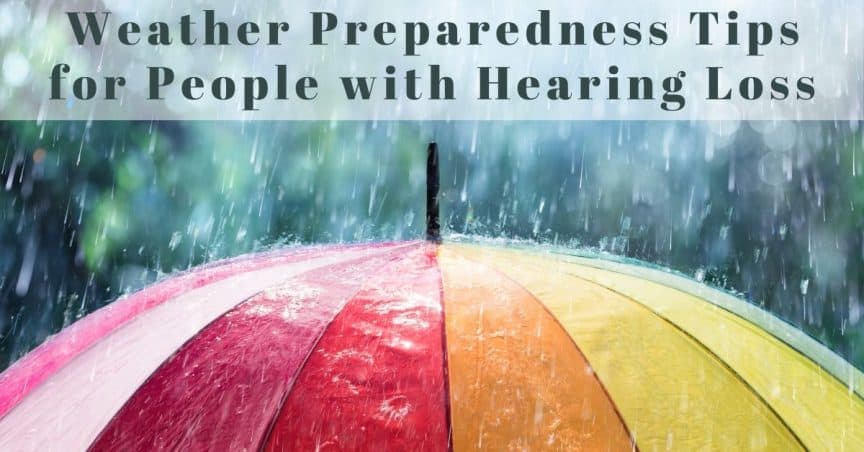- A Closer Look at Common Myths About Hearing Loss - May 7, 2024
- The Impact of Pets on Emotional and Hearing Health - April 26, 2024
- Strategies for Coping with Single-Sided Deafness - April 16, 2024
A weather emergency or natural disaster could strike at any moment and preparing for these events could make a potentially dangerous situation much safer. Weather alerts and warnings of severe weather are usually presented through radio and television announcements, which can be a challenge if you are living with hearing loss. If you do have a hearing loss we can recommend some important planning to add to your emergency preparation.
Know What You’re Preparing For
It is impossible to be fully prepared for every type of natural disaster that occurs. Luckily, we don’t have to be. Knowing the risks in your area and climate can help you to better prepare for the disasters that are most likely to occur. To get a better understanding of the most commonly occurring natural disasters in your state, internet search “your state emergency management agency”
Visual Notifications
While National Association of the Deaf has been advocating for these announcements, which are often also shared on social media, to be modified for the hard of hearing it’s important to modify your alerts in the mean time. This would include some sort of visual presentation including captioning and having the alerts on television with sign language. Weather alert radios as well as fire safety systems can be modified for people who are deaf or hard of hearing. They can vibrate or have a light alert for specific messages.
Authorized national, state or even local governments can send alerts regarding public safety emergencies and it isn’t limited to weather – it could include a public safety threat or perhaps an evacuation alert due to a chemical spill.
Emergency Kit for the Hearing Impaired
You will need two—one kit for your home and one portable kit should you need to evacuate. Both kits will contain similar items, but some (like water and snacks) will differ in quantity. Include:
- Copies of important documents like insurance cards, photo IDs, contact details of your family/emergency network, and a medication list with dosages. Keep these items in a waterproof container.
- Flashlights with extra batteries to help you navigate and lip-read. Bring a whistle or bell to get someone’s attention.
- First aid supplies, including an antiseptic cream, painkillers, bandages, and cleansing wipes.
- Hearing devices with spare batteries in waterproof containers. Include available backup devices and portable battery chargers, but make sure they are charged!
- A waterproof case to store your hearing aids in case water damage becomes an issue
Create and Emergency Network
Designate at least two people (friends, family, caregivers, neighbors, coworkers) to be part of your emergency network. You may want different networks for home and work depending on how far apart they are. Consider including somebody from out of town to act as a communication relay in case the local phone lines are jammed.
The people in your network will stay in touch during an emergency, have spare keys to each other’s homes, and know where to find emergency supplies. Your network must be familiar with your hearing loss as well as your hearing devices and the batteries or chargers required to operate them.
Make a Plan!
What if my hearing aids stop working in the middle of an emergency? What if I can’t find my aids during a disaster? It is important to think about the steps you would take during these hypothetical situations. If your hearing aids stop working, first: change the batteries. This is the most common cause for hearing aids stopping abruptly – and spare batteries should be available in your emergency kit. If you misplace your hearing aids or lose them during an emergency, be sure to have clearly marked signs identifying your hearing needs.
New Leaf Hearing Clinic
If you live in an area prone to severe weather, It’s important you can hear in case of an emergency situation. Contact us at New Leaf Hearing Clinic to set up a hearing test. We offer compassionate patient-centered care and treatment options at our hearing center. We are committed to helping you travel through life taking advantage of all the hearing solutions that technology now allows us to offer. We are here for you so you can hear your best, no mater what unexpected challenge life throws at you.

